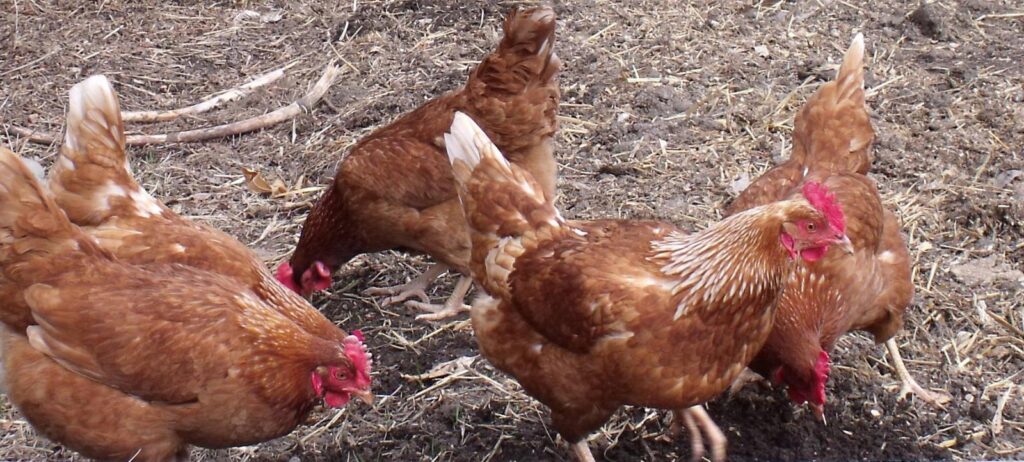Hens

The keeping of hens and roosters is allowed on properties zoned AG-Agriculture and RC1-Country Residential 1, without development specifications or restrictions. Hens (but not roosters) are also allowed in select zones within denser urban residential areas, limited to:
- CM1-Mixed Use Commercial
- RD-Residential Downtown
- RC2-Country Residential 2
- RCS-Comprehensive Residential Single Family
- RCS2-Comprehensive Residential Single Family 2
- RCS3-Comprehensive Residential Single Family 3
- RS-Residential Single Detached
- RS2-Residential Single Detached 2
A maximum of 6 hens is allowed on properties located in these denser zones. Coop development requirements apply, which are stated in the City’s Zoning Bylaw and Animal Control Bylaw. A permit is required that involves a neighbour approval and coop inspection process.
Coops located within denser urban zones must include a walled, roofed structure and an outdoor pen area. Coops must:
- Be securely enclosed to prevent the escape of hens, and prevent the entrance of other animals (e.g. wildlife and pets).
- Be no more than 10 m² in floor area.
- Be no more than 2 m in height.
- Be no less than 1.5 m from any property line.
- Provide at least 0.37 m² of interior floor area per hen.
- Provide at least 0.92 m² of outdoor pen area per hen.
- Provide a floor of any combination of vegetated or bare earth in the outdoor pen area.
- Provide at least one nest box and perch per hen. Each perch must be at least 15 cm long.
- Conform to all other accessory structure regulations.
Potential changes to the City’s hen and coop regulations were identified in the 2020 Local Food & Urban Agriculture Study.
Property owners interested in keeping hens in denser urban residential zones are required to complete an application form for a Hen Permit. Tenants may apply with the written consent of the property owner. There is no application fee. Allow 2 to 3 weeks for processing. Upon submission of a completed application form, the following will occur:
- Bylaw Services will circulate notice of the application to property owners within 3 m on all sides of the applicant property.
- If at least 60% of neighbours do not object to the activity, the applicant can proceed with developing a coop as per the specifications of the Zoning Bylaw.
- Bylaw Services will inspect the coop.
- If approved, the Inspection Certificate will be posted on the coop and must remain in place to be valid.
View the Hen Permit Application Form (due to COVID-19, applications can only be submitted at this time by email: bylaw.services@whitehorse.ca).
The City’s Animal Control Bylaw includes specifications to help ensure the safe and ethical treatment of animals. Any person who keeps one or more hen(s) shall:
- Keep each hen in its coop or pen at all times.
- Provide each hen with food, water, shelter, light, ventilation, veterinary care, and opportunities for essential behaviors, such as scratching, dust-bathing, and roosting, all sufficient to maintain the hen in good health.
- Maintain each coop in good repair and sanitary condition, and free from vermin and obnoxious smells and substances.
- Construct and maintain each coop to prevent rodents from harboring underneath or within it, or within its walls, and to prevent entrance by other animals.
- Keep a food container and water container in each coop.
- Remove leftover feed, trash, and manure in a timely manner.
- Store manure within a fully enclosed structure, and store no more than three cubic feet of manure at a time unless directed to remove and dispose of such manure sooner by the Designated Officer.
- Remove and dispose of all other manure in accordance with the Waste Management Bylaw.
- Keep hens for personal use only, and not sell eggs, manure, meat, or other products derived from hens.
- Not slaughter, or attempt to euthanize, a hen on the property.
- Not dispose of a hen except by delivering it to the pound keeper, or to a farm, abattoir, veterinarian, mobile slaughter unit, or other facility that has the ability to dispose of hens lawfully.
Learn more about poultry health in the Government of Yukon’s Poultry Health Handbook.
Straw and other organics used to line hen coops, along with hen manure, can be placed in your green cart for municipal pick-up. The carcasses of hens that have been euthanized cannot be placed in the cart, and should instead be left with the veterinarian, or taken to the landfill, for proper disposal.
Keep wildlife attracts at bay by following these management practices:
- Clean your coop daily.
- Store hen feed indoors (e.g. within a sealed container in your house, shed, or garage).
- Do not leave hens in their outdoor pen area overnight. Hens should be placed in the interior coop with doors and windows closed, in such a manner as to not allow predators to enter. (Ensure the coop has adequate ventilation!)
- Keep hens inside their enclosed area at all times.
- Do not place coops along fences that back onto a greenbelt or pathway.
Consider installing electric fencing, particularly in areas with high incidence of wildlife encounters:
- Government of Yukon booklet: Reducing Wildlife Conflict with Electric Fencing: A Beginner’s Guide
- WildWise web page on electric fencing
Noise nuisances created by hens can be reported to Bylaw Services. It is recommended that hen owners keep their hens in the interior coop area at night (between 11 p.m. and 7 a.m.) to ensure hen noises are not heard by surrounding neighbours or predators. Note that the nuisance provisions of the Animal Control Bylaw are in effect 24 hours a day, 7 days a week. Bylaw Services will investigate complaints received. Should a permit holder be convicted of more than one violation, the hen permit may be revoked.
